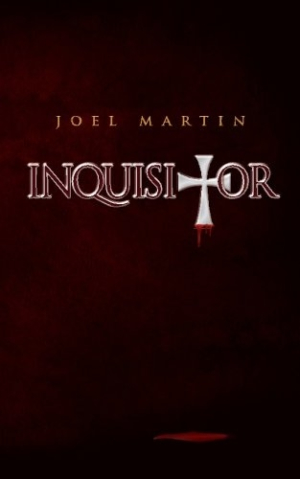
Inquisitor
A man in black, riding a black horse, comes to town. Is there any more certain sign that death and destruction will follow? Just as such an opening promises, murderous mayhem ensues in Joel Martin’s swashbuckling yet thoughtful fantasy novel, Inquisitor.
As death-dealing witch hunters go, the title character, Gabriel Lavoure, is unusually deep. He is part introspective gunslinger, part grim musketeer, and part philosophical Jesuit. Lavoure, however, is not the only protagonist in the novel. There are at least two, maybe three, or even four other characters who are in the running for the lead role in this adventure.
Martin’s work is reminiscent of the stories and characters of Alexandre Dumas, Hideyuki Kikuchi (of Vampire Hunter D fame), and Stephen King (in his Dark Tower series, in particular). There is also a touch of Star Wars here, with one of Martin’s two main villains channeling Emperor Palpatine/Darth Sidious. At points, it is all but impossible for a reader to have any other image but Darth Vader’s lord in mind when this character is on the page.
Both the heroes and villains of Inquisitor are colorful and lively. They spout many memorable lines: “Wherever I go, death follows like a shadow,” and “I expect you to die. You did not show mercy to the innocent so you will have no mercy from me.” Further evidence of Martin’s craft is this poignant line: “God does not need men to fight his battles. He does not need the burning of thousands to affirm his sovereignty.” It may very well be the novel’s central revelation.
Most of the action is at the skirmish level, either man to man, or one or two men taking on a few enemies. That said, in one epic battle a protagonist takes on no fewer than fourteen foes single-handedly, a scene that will undoubtedly satisfy fans of the genre. The novel also contains a few battles involving Ork-like creatures and their monstrous beasties. While these call to mind similar encounters in the books of R. A. Salvatore, Martin keeps them to a minimum.
Set in the seventeenth and early eighteenth centuries, with its slashing sabers, dueling pistols, and roaring cannons, Inquisitor is comfortingly familiar yet innovative enough to engage the reader’s imagination. The story is solid fantasy fare, with a little religion and a touch of dark magic to sweeten the pot, and just enough political intrigue to keep it all bubbling. The characters, like the plot, are full and rich. All of these elements combine to make Inquisitor a satisfying and beautifully-written read.
Reviewed by
Mark G. McLaughlin
Disclosure: This article is not an endorsement, but a review. The publisher of this book provided free copies of the book and paid a small fee to have their book reviewed by a professional reviewer. Foreword Reviews and Clarion Reviews make no guarantee that the publisher will receive a positive review. Foreword Magazine, Inc. is disclosing this in accordance with the Federal Trade Commission’s 16 CFR, Part 255.
